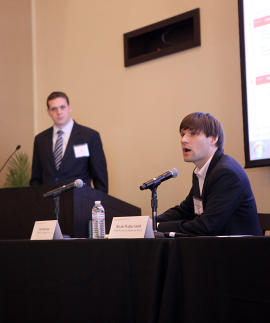 Yesterday I spoke at the We Robot: Getting Down to Business Conference at the Stanford Law School. I had the good fortune to comment on a paper by Bryant Walker Smith titled Human Factors in Robotic Torts. My comments focused on the legal implications of how autonomous vehicles. It was a great conference with some of the leading minds in robotics, artificial intelligence, and policy.
Yesterday I spoke at the We Robot: Getting Down to Business Conference at the Stanford Law School. I had the good fortune to comment on a paper by Bryant Walker Smith titled Human Factors in Robotic Torts. My comments focused on the legal implications of how autonomous vehicles. It was a great conference with some of the leading minds in robotics, artificial intelligence, and policy.
My buddy Declan McCullagh did a write-up in CNET, quoting me in a few spots:
Self-driving cars are expected to save lives: a vehicle driven by a human will experience, on average, a crash every 160,000 miles or so. It’s only a matter of time, advocates say, before robots become better drivers than us.
That is, if the lawyers let them. Industry insiders are already fretting about a host of legal problems that could bedevil robot car makers once a sufficient number of their creations take to the roads. Product liability, tort law, negligence, foreseeable harm, patent encumbrance, and design defects are only some of the concerns.
“The longer it takes for this technology to reach the market, the more people die,” Josh Blackman, a law professor at the South Texas College of Law, said yesterday at a conferencehosted by Stanford University called “We Robot: Getting Down to Business.”
Over 100 of the brightest thinkers about self-driving cars and other robotic machinery gathered here this week to debate legal snarls that could ensnare these machines. Papers presented included ones with titles “Human Factors in Robotic Torts,” “Risk Management in Commercializing Robots,” and “Application of Traditional Tort Theory to Embodied Machine Intelligence.”
…
Allowing self-driving cars to share the roads with self-driving teenagers will likely result, in some cases, with human-initiated attempts to see just how quickly a robot can apply the brakes or how it will respond to attempts to run it off the road. Or programming errors could cause an accident that results in human injury or death.
Once that happens, headlines about self-driving cars causing accidents will “set back the movement significantly,” Blackman says. That could result in a legal crackdown on a useful technology that will save far more lives than it takes.
(though, the line about people dying, I’m pretty sure, was in a slightly different context about what delays caused by regulatory hurdles to this technology may create , but close enough) All-in-all, an excellent conference.